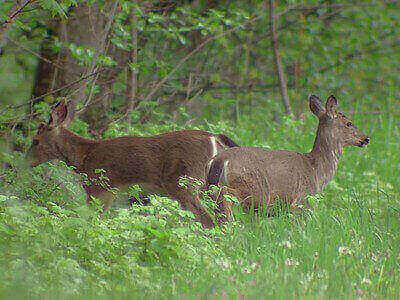Disclosure: We may earn commissions if you purchase products after clicking on a link from our site.
Are you thinking of hunting blacktail deer? Do you want to learn how to hunt blacktail deer? Blacktail deer are considered the ghosts of the forest by hunters. One minute they are right there and then the very next minute, they simply vanished. In this article, we share information and knowledge to help you be successful in hunting the “ghost of the forest”.
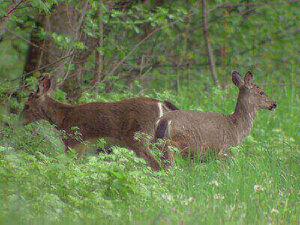
How To Hunt Blacktail Deer
1. Blacktail Deer Scouting
Scouting blacktail deer involves careful observation, exploration, and research to identify the habitats, behaviors, and patterns of these elusive animals. Blacktail deer are known for their reclusive nature and preference for dense vegetation and rugged terrain, making them challenging to locate.
Hunters typically begin scouting by studying maps, aerial imagery, and topographic features to identify potential deer habitats, such as dense forests, brushy thickets, or steep hillsides. Once potential areas are identified, hunters venture into the field to search for signs of deer activity, such as tracks, droppings, rubs, and bedding areas.
Trail cameras can also be deployed to capture images of deer movements and patterns. Successful scouting often involves spending extensive time in the field, quietly observing deer behavior, learning their travel routes and feeding areas, and adapting strategies accordingly. By gaining a deeper understanding of the terrain and the habits of blacktail deer, hunters can effectively plan their hunts and increase their chances of a successful harvest.
When scouting for blacktail deer, look for tracks, scat, game trails, watering holes, rubs, beds, shed antlers, areas with clear cuts, and narrow trails. They like “edge” habitats where heavy timber is adjacent to meadows, clearings, shorelines, brushy slopes, and clear-cuts.
The home of a blacktail deer is considered the greatest defense strategy it has. When it experiences hunting pressure, blacktail deer retreats to its home which is usually characterized by impenetrable vegetation and is wet and foggy.
Blacktail deer live their entire lives in an area of just a few square miles. Therefore, when you find an area that shows signs of blacktail deer activity, there is a high chance that they live close by. Look for possible entry and exit points from the area.
2. Wildlife Biologist
Engaging with wildlife biologists assigned to the area where you plan to hunt blacktail deer can provide invaluable insights and guidance for a successful hunting experience. Wildlife biologists possess expert knowledge about local deer populations, habitat preferences, migration patterns, and population dynamics.
By reaching out to these professionals, hunters can gain access to up-to-date information on deer densities, population trends, and any relevant regulations or management practices in the area. Wildlife biologists can also offer recommendations on prime hunting locations, optimal hunting times, and effective hunting strategies based on their understanding of deer behavior and ecology.
Furthermore, these interactions foster collaboration between hunters and conservationists, promoting responsible hunting practices and contributing to the sustainable management of deer populations. Overall, leveraging the expertise of wildlife biologists can enhance the hunting experience while ensuring the conservation and management of blacktail deer populations for future generations.
3. Trail Cameras
Using trail cameras is a valuable tool for hunters seeking to pattern blacktail deer and improve their chances of a successful hunt. These cameras are strategically placed in areas frequented by deer, such as trails, feeding areas, or bedding sites, and automatically capture images or videos when triggered by motion or heat.
By deploying trail cameras, hunters can gather valuable intelligence on deer movements, behaviors, and the presence of mature bucks in the area. This information helps hunters identify key travel routes, feeding patterns, and the best times to hunt, allowing for more strategic placement of hunting stands or blinds.
Additionally, trail cameras provide insight into the size, age, and antler characteristics of deer in the area, helping hunters make informed decisions about target animals and trophy potential. Regularly checking trail camera footage allows hunters to adjust their hunting strategies accordingly and increases their likelihood of encountering blacktail deer during the hunting season.
Overall, trail cameras serve as essential scouting tools that enhance the hunting experience and contribute to more successful hunts for blacktail deer. We did a review of the best trail cameras on the market that you can read.
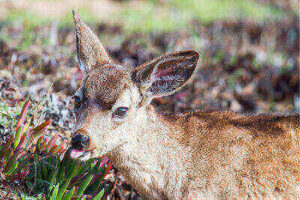
4. Predator Calls
Using predator calls can be a strategic approach when hunting blacktail deer, as these calls can elicit curiosity or trigger a defensive response from deer. Although blacktail deer are not typically preyed upon by traditional predators targeted by calls, such as coyotes or mountain lions, they may still be intrigued or alarmed by the sound of distressed prey animals.
Hunters can utilize predator calls that mimic the sounds of wounded or distressed small mammals, birds, or even predator vocalizations to attract blacktail deer within range. By strategically placing themselves downwind of the call and remaining concealed, hunters can create a convincing illusion of natural prey distress, potentially drawing in curious or cautious deer.
Predator calls can be particularly effective during periods of low deer activity or when other hunting methods have proven unsuccessful. However, hunters should exercise caution and ensure compliance with local hunting regulations when using predator calls, as improper use may spook deer or disturb the natural ecosystem.
Overall, incorporating predator calls into the hunting strategy can add an element of unpredictability and excitement to the hunt, potentially increasing the hunter’s chances of encountering blacktail deer and achieving a successful harvest. With so many brands and models of predator calls, we reviewed the best predator calls available today.
5. Bait
Using bait when hunting blacktail deer can be a contentious topic and is regulated or prohibited in many areas. However, where legal and ethical guidelines permit, baiting can be a strategic method to attract blacktail deer into shooting ranges.
Hunters typically use bait such as corn, grains, or specially formulated deer feed, strategically placed in areas frequented by deer. The goal is to entice deer with a readily available food source, increasing the likelihood of encountering them. Baiting can be particularly effective during periods of low natural food availability or when deer populations are sparse.
However, hunters must exercise caution to avoid over-reliance on baiting and ensure that it does not negatively impact the natural behavior of blacktail deer or disrupt the broader ecosystem. Additionally, hunters should be aware of and comply with local regulations governing baiting practices.
When used responsibly and in conjunction with other hunting strategies, baiting can be a valuable tool for hunters seeking to harvest blacktail deer in their natural habitat. Not all states allow the use of bait when hunting blacktail deer. You can learn your state hunting laws by going to this website.
6. Glassing
Glassing the hunting area is an essential practice for hunters pursuing blacktail deer, as it allows for thorough observation and assessment of the landscape, potential deer habitats, and deer activity. Blacktail deer are known for their elusive nature and preference for dense vegetation, making them challenging to spot with the naked eye.
By using binoculars or spotting scopes to systematically scan the terrain, hunters can identify deer movement, feeding areas, and bedding sites from a distance. Glassing also enables hunters to locate potential travel corridors, transition zones, and natural funnels that deer may use during their daily routines.
This methodical approach to scouting the hunting area helps hunters develop a deeper understanding of deer behavior and movement patterns, allowing them to plan their hunts more effectively. Additionally, glassing allows hunters to assess the trophy potential of deer in the area, helping them make informed decisions about target animals.
Overall, glassing is a critical component of successful blacktail deer hunting, enabling hunters to gather valuable intelligence and increase their chances of a successful harvest.
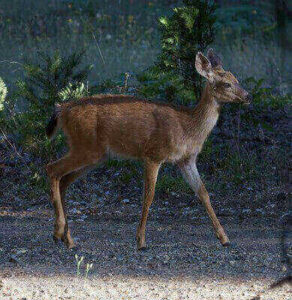
7. Wind Direction
Knowing the wind direction is paramount for hunters pursuing blacktail deer as it significantly impacts their ability to remain undetected and approach their quarry effectively. Blacktail deer possess keen senses, particularly their sense of smell, which they rely on to detect potential threats.
By understanding the wind direction, hunters can position themselves strategically to ensure that their scent is carried away from the deer’s location. This minimizes the risk of alerting the deer to their presence and increases the likelihood of a successful hunt.
Additionally, hunters can use the wind to their advantage by setting up ambush points or stalking routes that allow them to approach deer from downwind or crosswind positions, maximizing their chances of getting within shooting range undetected. Ignoring wind direction can result in spooking deer and ruining potential hunting opportunities, emphasizing the critical importance of wind awareness in blacktail deer hunting.
8. Ambushing Blacktail Deer
You can collect information from trail cameras and satellite images to determine possible bedding and feeding areas. With this information, you can find a good hunting spot between the bedding and feeding areas, possibly closer to the bedding areas, and set up and wait for the deer. Hunters refer to this as ambushing the deer. Many hunters believe the best way to ambush blacktail deer is with a treestand.
9. Treestands
Using treestands can be an effective strategy for hunters pursuing blacktail deer, particularly in areas with dense vegetation or limited visibility at ground level. By elevating themselves above the deer’s line of sight, hunters gain a strategic advantage in spotting deer movements and approaching their quarry undetected.
Treestands provide hunters with a concealed vantage point that offers a broader field of view, allowing them to observe deer activity and select their shots with precision. Additionally, hunting from a treestand helps minimize the hunter’s scent dispersal, as their scent is carried above the deer’s sensitive noses, reducing the risk of alerting deer to their presence.
When using treestands, hunters should ensure they are securely installed and use safety harnesses to prevent falls or accidents. Overall, treestands can be a valuable tool for hunters seeking to increase their chances of success when pursuing elusive blacktail deer.
Find a good spot with a lot of views and shooting lanes to set up a treestand. The treestand should not be too close to the area where you expect blacktail deer to hang out. Additionally, it must be in your shooting range. You will have a higher chance of success if you use a treestand to hunt blacktail deer. A review of the best climbing treestands can be accessed from this link.
10. High-Quality Optics
Using high-quality optics is essential for hunters pursuing blacktail deer as it can significantly enhance their ability to spot, identify, and track deer in challenging terrain. Blacktail deer are known for their elusive nature and preference for dense cover, making them difficult to detect with the naked eye alone.
Binoculars or spotting scopes with superior optics offer hunters clear and magnified views of distant objects, allowing them to scan the landscape with precision and spot deer hidden in thick brush or shadowy areas.
Additionally, high-quality optics provide excellent light transmission and clarity, enabling hunters to distinguish subtle details and movements, such as antler tips or flicking ears, that may indicate the presence of deer.
Superior optics also reduce eye strain and fatigue during prolonged glassing sessions, ensuring that hunters can maintain focus and concentration throughout their hunt. Investing in high-quality optics is therefore essential for maximizing the effectiveness and enjoyment of blacktail deer hunting, giving hunters a distinct advantage in spotting and harvesting their quarry. If you are interested in binoculars and spotting scopes, we reviewed the best hunting binoculars and the best spotting scopes that you can read from these links.
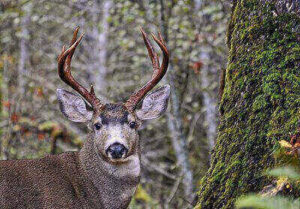
Blacktail Deer Hunting Tips
1. When hunting blacktail deer, use the spot and stalk or stand still hunting methods.
2. Look for tracks, scat, beds, rubs, antler sheds, and narrow trails when scouting for blacktail deer.
3. Blacktail deer are considered homebodies as they live their entire lives in an area that is just a few square miles.
4. In areas where long-distance glassing is not feasible, you should still hunt the deer.
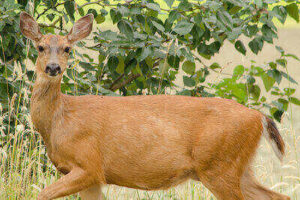
5. When hunting for blacktail deer, always hunt downwind of the deer. This means that the wind should be in your face.
6. Early morning and late evening are the best times to glass for blacktail deer.
7. You can set up trail cameras to collect information about blacktail deer like their patterns, movements, and possible feeding and bedding areas.
8. With the information you gathered from trail cameras, you can set up a tree stand between the bedding and feeding areas and wait in an ambush for deer.
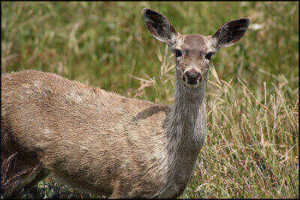
9. Bait can also be used to hunt blacktail deer but you must know if it is legal in the state you hunt.
10. Setting up a treestand is one of the best ways to ambush a blacktail deer.
11. Talk to the wildlife biologist for the area you want to hunt in to get information about blacktail deer in that area.
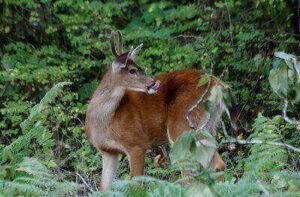
12. Use predator calls to lure blacktail deer. The fawn bleats can attract does and bucks.
13. Fawn bleats are usually used by hunting that implements still-hunting strategies.
14. Set up treestands to hunt blacktail deer.
15. The best time to find a blacktail buck is before heavy rain, or right after the rain stops.
16. When glassing for blacktails, look for a horn or an ear twitching.
17. Use binoculars or a spotting scope to glass an area for blacktails.
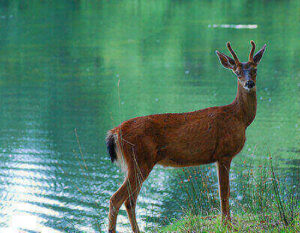
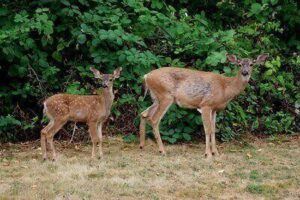
The Bottom Line
Hunting blacktail deer is very challenging as they reside in impenetrable and tangled cover. They are referred to as the “ghosts of the forest” as no sooner do you see them and the next second, they disappear. Hunting blacktail deer requires, good scouting, planning, and implementing tried and tested strategies.
In this article, we discussed how to improve your chances of successfully hunting blacktail deer using some hunting strategies. You can also read how to hunt fallow deer, how to hunt sika deer, how to hunt red deer, how to hunt axis deer, how to hunt blacktail deer, and the best mule deer hunting tips.
